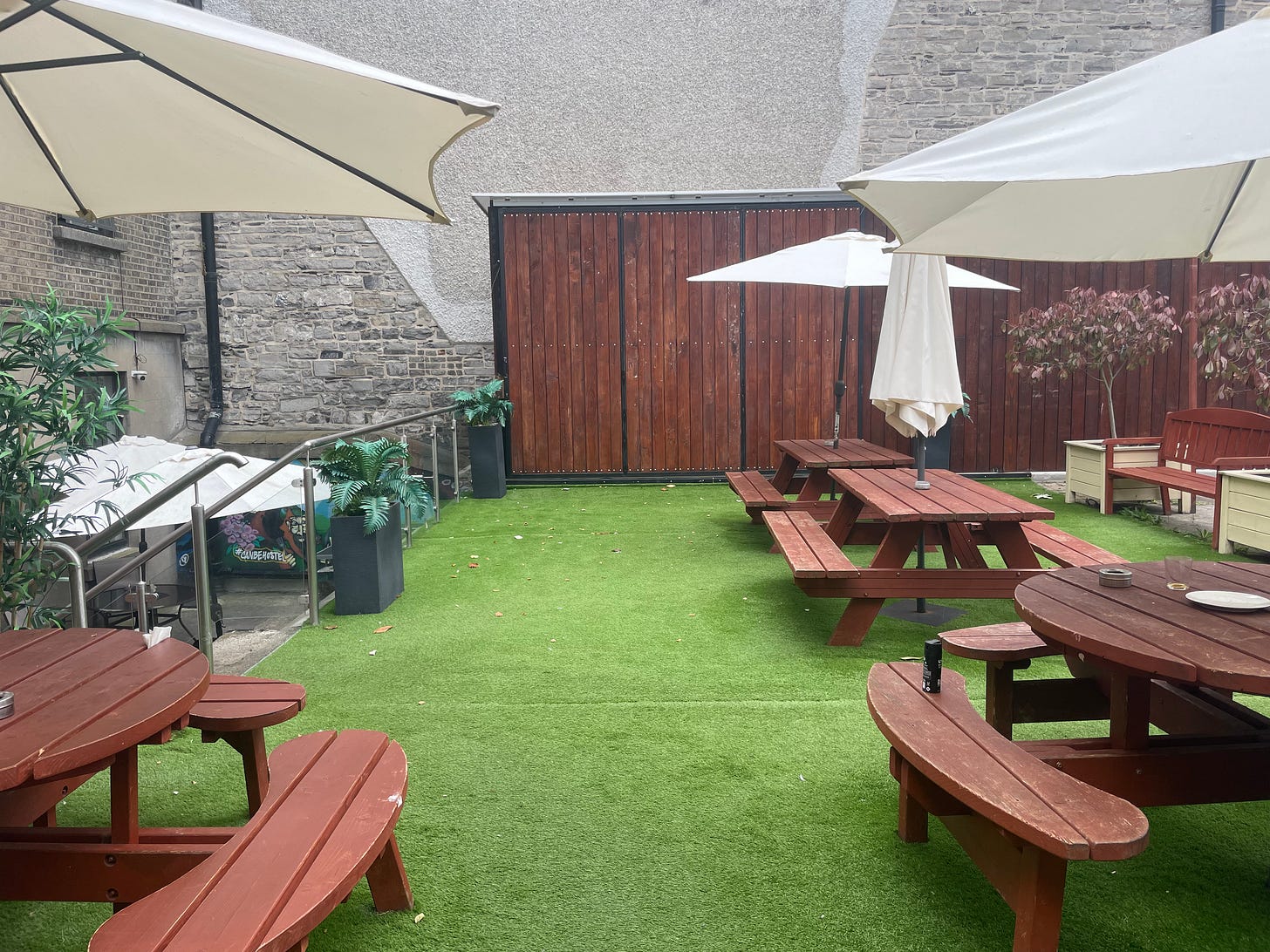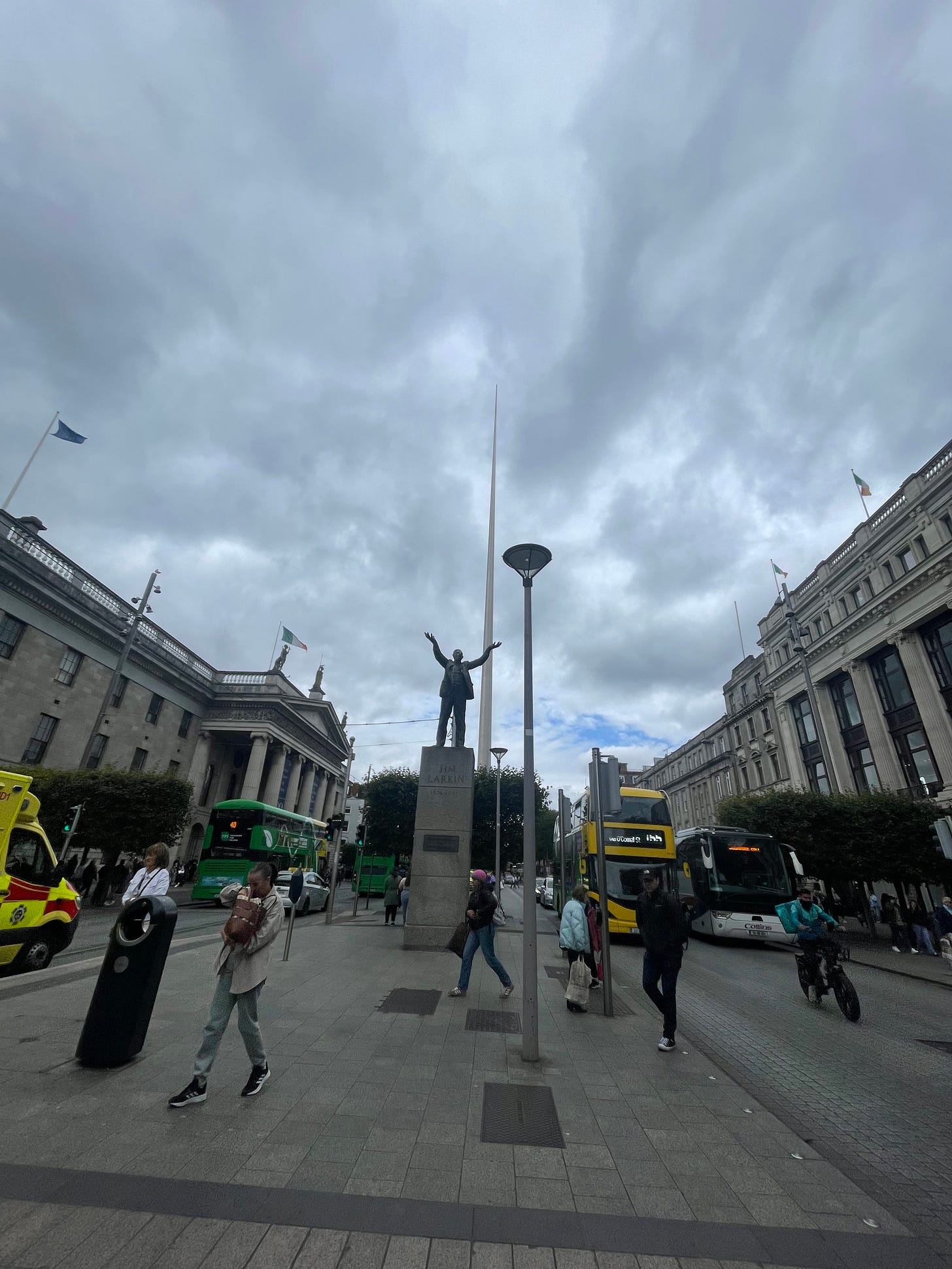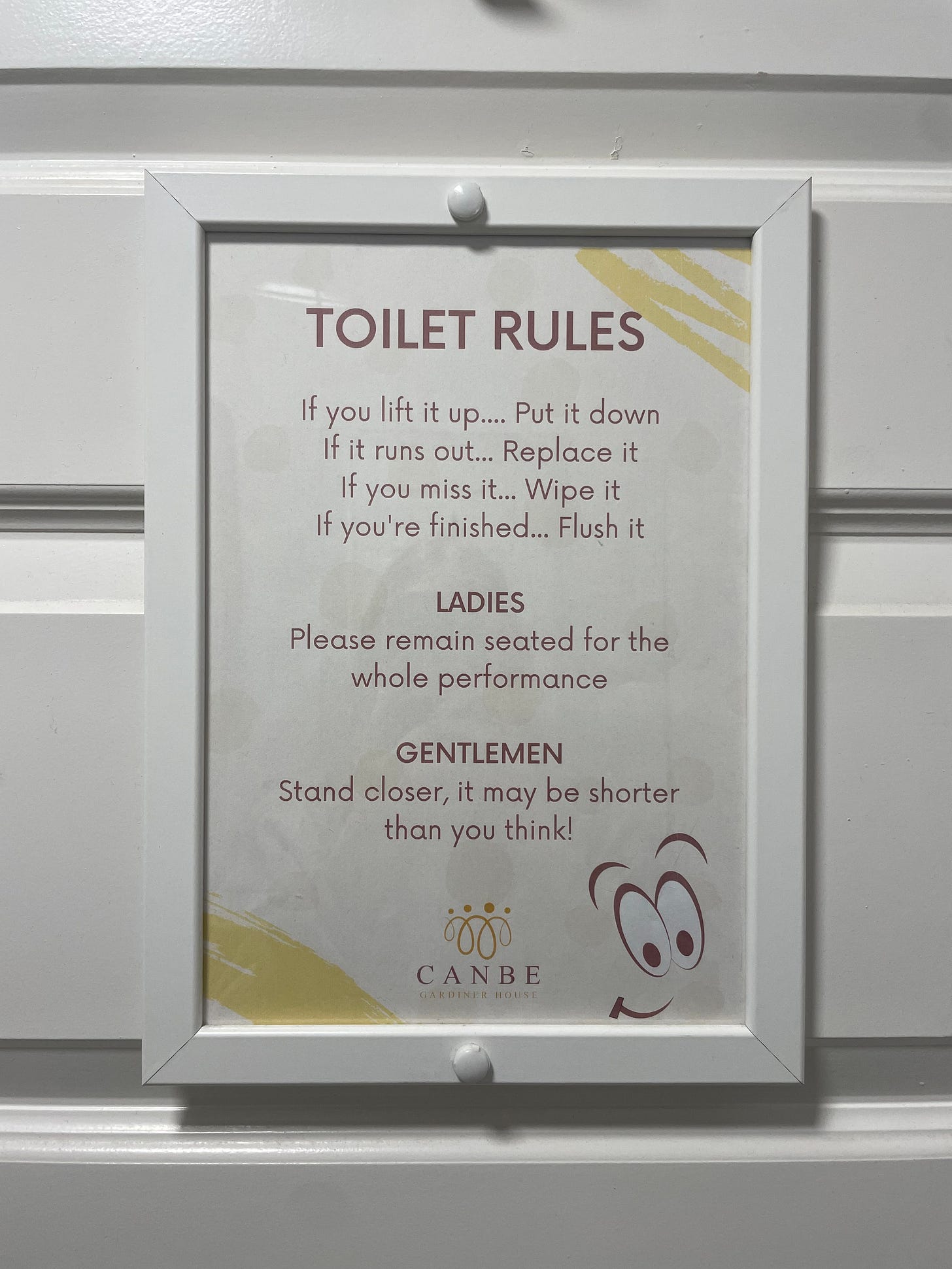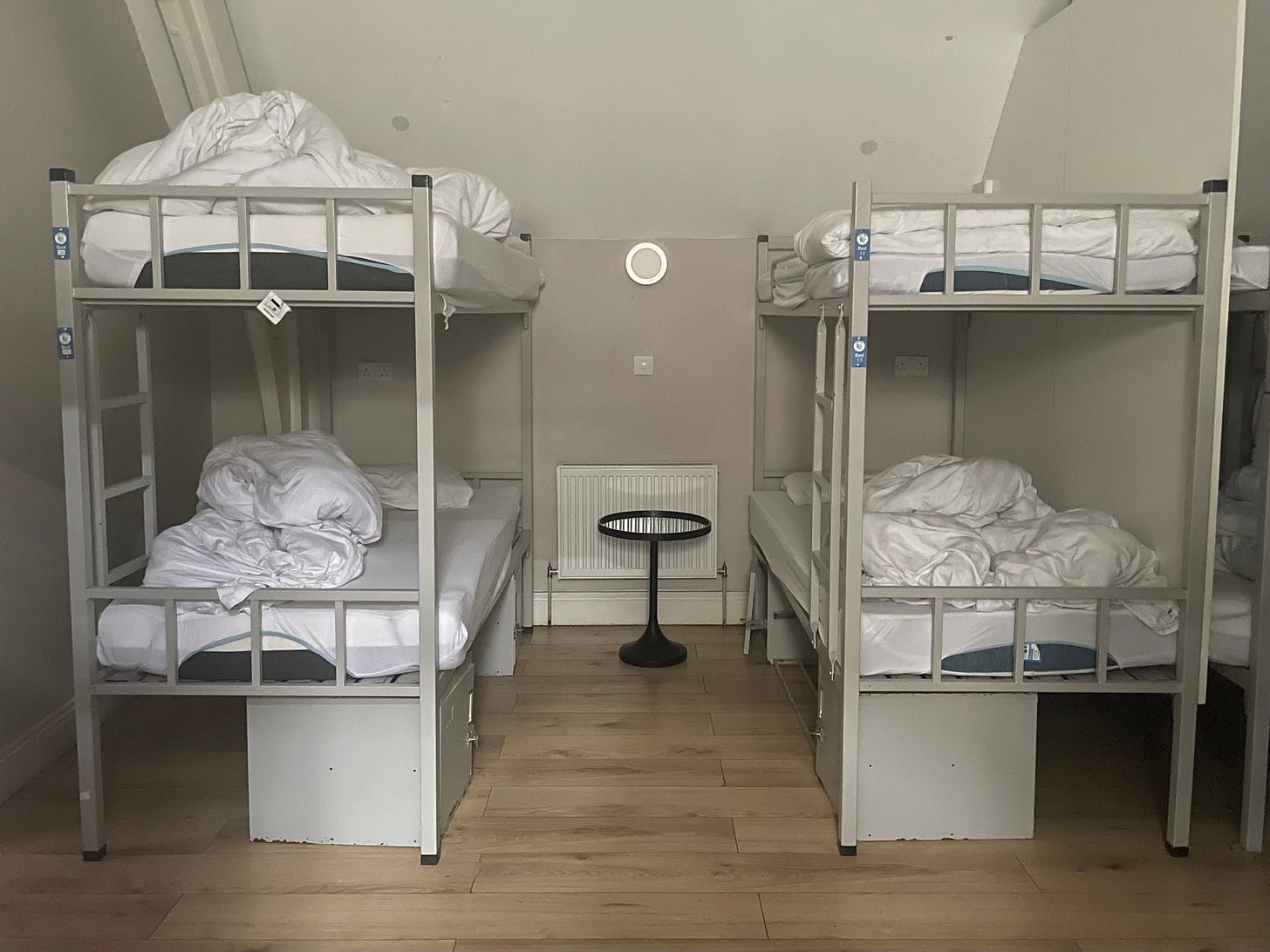Dear Close Friends,
I recently spent four days in Dublin, alone. I stayed in a hostel, because it was cheap and because I’d always wanted to experience hostel living. On my final night, while washing my face in the communal bathroom (pictured below) I pondered what to write about the trip. The hostel was an rich setting, but I’d made no friends. Nothing interesting had happened. Ah, I thought to myself, I’m a fiction writer. So why don’t I just make something up? The following is a short story about people who do make friends at the hostel, and the interesting things that happen to them.
I also owe fair credit to Lucy Caldwell, whose short stories I ripped through during my short time in Dublin.
Marcus offered to take the bottom bunk, and that was how it started. Twenty-two years old and two meters tall, he’d long since learned to address his height without making it awkward. OK if I took the floor? he asked Huey, who was primping the pillows. I sometimes topple these things over. Marcus’s handsome shrug and apologetic smirk, his wide nails tapping the flimsy metal bedrods. Huey laughed and agreed to switch, feeling none the smaller for it. They got to chatting. Huey was on a solo trip, backpacking through Europe after graduation. Marcus was here for work, actually, being paid a stipend to write articles for an Italian travel website. Jokes about shit jobs and tourists, acknowledgments of the gloomy weather. Here, Gearalt found his entrance. Cain’t do shite about the rain, tha’s just Dublin for ya. The boys turned to find a scraggle-bearded fellow slumped in the dim towel-cave of a nearby bunk. Beneath a mess of hair and blankets, he appeared to be twenty-something—about the boys’ same age. But I could help with the nixer, he said. Half a’ tha’ you can skip. Here, what’s your list? After some scuttling introductions, Marcus had scrapped his assigned itinerary and was thumbing out notes. Dublinia—ok for kids, fine view, tree stars. Book a’ Kells—SKIP. It was decided that Gearalt would be their local guide for the week. A mutually beneficial arrangement, as he needed to scope out the city for vacancy signs, anyway. He was transferring to Trinity in the fall, from Mullingar, only staying at the hostel till he found a place of his own. Halls are for first years, he said. Someone flicked the light—quiet hours were meant to start at nine. Marcus suggested a cigarette and they all glided out to the patio, buoyant and easy.
Lonnie lay flat in the bunk above Gearalt’s, hearing it all go down. The door slam—the silence that followed. He tried not to panic. Something interesting was happening, without him. He’d been alert since the beginning, geared up to say hi when it was just Huey. But Marcus’s entry made sense—let the bunkmates meet, and then Lonnie could fold in. He’d prepared a very clever joke about Italian travel and was just about to say it when Gearalt had so naturally joined, a freak out of nowhere. And then it was done, and now they were gone. Lonnie had missed his chance. Ten more minutes and they’d be best friends, and Lonnie would be alone, his sad vacation already a flop. Unless—unless… Just do it, thought Lonnie. The Nike logo flashed in his mind’s eye, invasive thought of a sweaty Michael Jordan. Be a man. Lonnie walked to the patio in a lightheaded daze, keycard sharp in his sweaty fist. Hey guys, can I snag one from you? Stupid, snag? Did people even say that? Lonnie didn’t smoke—he prayed he’d pulled it off. And suddenly Marcus was handing him a cigarette, even lighting it so that Lonnie didn’t have to mimic the movies. And Huey asked the easy questions, why’d he come to Dublin, how long was he here for? Lonnie answered and the others smiled at this fact of alignment. He felt brave. Italian travel, right? Hey, when not in Rome! Said aloud, he realized how stupid this joke was, but it didn’t matter because the boys were already grinning, piling on with more dumb jokes at the expense of Marcus’s motherland. Marcus didn’t mind. He said it first: we’re kings, kings of the hostel. Together for one week, Sunday to Saturday—it was fated.
Gardiner House was the name of the hostel. It was built on the site of an old Catholic convent, and much of the original structure remained. Stained glass shimmered in the sanitized bathrooms, a stone basin of holy water hung near the exit. The boys were staying in a room called The Chapel Experience. The window nearest their alcove featured a blue-robed Blessed Virgin, tending to 12 floating cherubs. Mary loomed over their bunks, watchful until somebody shuttered the blackout blinds. According to Yelp, the hostel was in a bad part of town. The boys agreed that reviews didn’t matter, especially those from wimpy American tourists. Huey and Lonnie snickered along, happy to be honorary Europeans. Gardiner House was a mile’s walk from Temple Bar. Each night (they decided, after that first night) they’d fill up on cheap shawarma then launch over the O’Connell bridge, hit the town for a Guinness, and then something stronger, and then back to Guinness, and then back to the hostel for a cigarette. There was no curfew at the hostel, so even when the other travelers complained of the noise, there was nothing the deskman could do. He did urge the boys—man-to-man—to wind down in the rec room with a game of pool, when possible.
After two nights of such rollicking, a hungover Marcus insisted that he really should get some work done. The others agreed; they could stand a bit of sightseeing. Gearalt was reluctant, carping that he’d already done ‘tal on school trips from Mullingar. Quit giving out, Lonnie said—he’d picked up some Irish slang. They could smoke the hash they'd bought from the barman at Cassidy's, he argued, take the edge off anything too cultural. Lonnie had his own agenda, and was waiting for the right time to reveal it. He found his opening at Dublinia—the viking history museum. They were pantsing a wax model when Huey noticed an older woman crying. They tuned in to the video she was watching: a forensic study of a nearby skeleton, a teenage warrior, tall in stature. Your brother, Marcus. Basta! Listen! The warrior had compressed vertebrae, indicative of a hard life and back problems beyond his years. Yet he was buried with a comb and a clothing pin, symbols of a privileged status. The woman dried her eyes with a sweater sleeve and the boys eased away, each quietly touched by this mother’s love for a child from a thousand years ago.
At afterdrinks, the conversation turned tender. Swapping stories of mas—Gearalt and Lonnie’s single ones, Marcus’s flanked by a court of aunts and sisters. Huey’s embarrassed admission that his own parents were still together. This round’s on you, then! saying Gearalt. Lonnie pounced on the brightening moment. Wasn’t it curious, he posed, to think of the long line before you? Wouldn’t it be neat, to learn the stories of your ancestors? And don’t you know it, can’t you find ‘em here in Dublin? As though he didn’t have swaths of names in his phone already, as though his suitcase weren’t stuffed with packets of family trees printed from Ancestry.com, evidence of his obsession. The boys saw right through it. Ahh, we’ve got a history freak on our hands! Wants to be Irish, eh? said Gearalt. Everything’s in my Nonna’s trunk, totally Sicilian, said Marcus. I’m in your Nonna’s trunk, tried Lonnie. Huey, ever-sensitive, tossed the lifeline: I did one of those things, 23 and Me? Came back mostly French but a little Northern Euro. I’d be interested to know what flavor. Quit actin’ the maggot, said Gearalt. Next you’ll be wantin’ promise rings. After some bonus ribbing for the Americans, it was settled. They’d visit the Family History Center on Friday—the last full day of their trip.
Lonnie had always been the boring kid growing up. Not cool enough to be popular, nor odd enough to fall in with the hallway freaks. He was just another thin boy, with straight hair and a slightly downturned mouth. Girls liked him sometimes, and he’d always had friendly acquaintances: people that hosted board game nights and asked him to after-class drinks. But nothing—nothing—like this. Huey, Marcus, Lonnie, and Gearalt: they were a circus. Wild beasts on a rampage, an ancient fraternity. And Lonnie, a tiger along with the rest of them. He hadn’t known till now what he’d been missing. At the thought of losing them, his chest felt like a windless tunnel. Late mornings at the hostel while the others slept off the night, he’d lie in wait, glaring at the door. It would be just his luck for a seasoned traveler to walk in and charm everyone with tales of the Far East, wow them with trilingual phrases. Or else, a girl. Some bird with ass-length hair would saunter in and Yoko the band. She’d fall for Marcus first, then Huey would win her over with his straightlaced chivalry, and then she’d turn to Gearalt for some bad boy action. In none of these paranoid visions did Lonnie get the girl.
There was a girl, actually. Annika—they’d nicked her name from an open notebook: Dieses Buch gehört Annika Wewerke. A wondrous name for the greasy blonde ponytail that peaked from a duvet late into the afternoon, emerging as a full woman only at rare hours of the night. An Annika sighting was grounds for a cigarette. Boys. I bumped her in the bathroom, Marcus said on Wednesday evening. Wise up, said Gearalt. It’s true. Marcus grinned. In only a towel. The boys traded field notes on Annika, trying to triangulate her age and breast size. I just want to know why she sleeps all day, said Lonnie. Don’t be noble you want to nail her just like the rest of us. It was decided that Huey should do the honors. In the wee hours of Thursday morning, the boys helped him pen a note in wiggly cursive. A proper leprechaun, whispered Gearalt as Huey placed the note on her pillow. Annika returned from wherever she was around dawn, just as the Blessed Virgin began to glow with morning light. Lonnie watched from his perch as she read the note, looked around, and narrowed her eyes at the sleeping Huey. I think you’re hübsch. Abendessen morgen? — Bunk 3A, he’d written. Annika folded the paper and tucked it into her passport, then placed her passport under the covers at the foot of her bed. When the boys woke up in the afternoon, she was gone—her sheets crumpled and her other things vanished away.
Huey found a Kinder chocolate bar on the windowsill by his bed. He was quiet all day, barely remarked on the eons-old antlers at the history museum. Over dinner at the museum café, he told them why. I was engaged, he said into his shrimp salad. Or, well, almost. Let’s hear it then. Gearalt signaled to the waiter for another round of drinks. They’d all known something was coming, ever since Marcus pissed in the Iveagh Gardens earlier that day—Huey was usually the one who kept them in check. I proposed to my girlfriend at the Cliffs of Moher. She always wanted to go so I planned this whole trip, and I proposed and she said no. And that’s why I’m here. She left early and I stayed. I don’t know, to… I don’t know. She said no and I didn’t expect that. How long were you together? Lonnie asked. Huey was quiet for a beat. Four years. All of college. It was our anniversary. It was… The boys took it in—Huey’s sweet pudgy face, crinkled chin, wettened eyes, sad like a blobfish. He sipped his Chardonnay and sighed. I really appreciate you guys. I didn’t know what to do. I haven’t told my parents, or anyone back home. I was just going to kill myself maybe, he laughed, but you guys. Just. It’s been really nice. So thank you. Of course man. Marcus patted Huey’s back. Seriously, said Lonnie. She doesn’t deserve you. He expected Gearalt to elaborate, to call her a tart or a slapper, but he didn’t. He said: Tha’s hard. There’s nothin’ like that. Hey, least you loved. The world’ll break your heart, but you hafta love anyway. Lonnie resisted the urge to interrogate: had they spoken since? Did she give a reason? How old were they anyway, surely too young? Do you still have the ring? he decided to ask. Huey laughed, and reached into his tote bag. Yeah. I don’t trust those hostel lockers so I’ve been carrying it around with me. I feel like it’s cursed. He opened the velvety box and the boys peered in. A silver band, little diamonds flanking a lilac stone. Amethyst, Huey answered no one. Maybe that’s why she dumped me. Did she give a reason? Lonnie asked. His cock was too big, Gearalt said soberly. They laughed and the talk moved on to other things.
The next day was Friday, everyone’s last full day in Dublin. Except for Gearalt, who still hadn’t found a place for the coming semester—whenever they suggested looking, he brushed them off. Marcus woke up early to visit a few straggling locales on his list: Dublin Castle, Christ Church Cathedral. (Gearalt had already ghostwritten Marcus’s blog on the Guinness Factory, arguing they could use the ticket money to buy five times that amount of Guinness at Cassidy’s.) They all met up at the National Library. Huey, Lonnie, and Gearalt applied for library cards while Marcus explored the Yeats exhibit. An interesting man, he said when he emerged from the dark hall. Looks like you, Lonnie boy. Famous player, said Gearalt, just like me mucker here! Huey half-heartedly shook off Gearalt’s noogie. Lonnie gave the librarian an apologetic nod, but he wasn’t too embarrassed. His original mission, so happily sidelined, was returning into focus. He noticed a tightness in his chest, his heart clenched around something rare: hope.
Ready? Your jackets and bags. Put them in these lockers. Why? Because some of those documents are the only ones in existence. Lonnie had learned this months ago, on a phone call with an archivist at the Family History Center. He got the impression that this man was used to a lot of questions, which emboldened him to ask even more. What was the best strategy? Pick a few key relatives and go from there. Do one line a day. Most start with grandparents. Cross reference everything—maps, censuses, gravestones. Parish records were a goldmine. The popular websites were mostly lies, Americans were the worst culprits. Just start with the names you know. Lonnie had originally planned to work all week, a Guinness a day and just hunker down. He hadn’t planned on the boys. But no regrets: he had an idea. Here, he said, handing worksheets to everyone. They were in the research center, a fluorescent-lit computer room with several low bookshelves—nothing like Lonnie’d expected. You all get a grandparent, he said. YOU get a grandparent, YOU get a grandparent, said Huey. Ha ha. Here, you can be Bridget Joyce. Any relation to the famous fob? We’ll see. Who are these people? asked Marcus. My father’s grandparents. Thought your pa was out of the picture, said Gearalt. He’s the Irish one, Lonnie explained. The boys focused on their worksheets, quiet until a discovery was made. Your great granda had a bloodhound! called Gearalt. Nothing but Catholics and farmers, said Huey. But you’re certainly Irish.
Lonnie clicked through his self-assigned line, squinting through a deep headache. Edward Ready III: his paternal grandfather. Lonnie colored a life for him. Eddie Ready, they might’ve called him, the grandson of famine refugees—Catholics from Knockcroggery, parish records confirmed. Edward begat Edward begat Edward, begat Austin, who begat Lonnie and then died of a heart attack one morning three months ago. After Lonnie’s mother called, he’d sat down and tried to feel anything. For days, nothing. Then, on the seventh day, he’d cried, tears welled from a pit of empty grief. He had no context for his father, aside from his mother’s bitter tales. Austin Ready was a smudge of blond in memories Lonnie wasn’t sure were real. Was that smudge the reason for Lonnie’s receding hairline? The genetic culprit for Lonnie’s droopy posture? His lack of character, discipline, or friends… With no prospects after college, he’d decided to come to Ireland in search of something solid to grip. In these scanned records, had he found anything? Here, said Marcus. Something not farmers, Lonnie boy—your great supergrandfather was a pipemaker! Gearalt rocketed from his plastic chair. Let’s gooooooooo! he said, shaking Lonnie’s shoulders and startling a nearby elder. Huey and Marcus joined in. Let’s gooooooooo! they shouted, hooting in a pile-on until an archivist kicked them out.
They were too keyed to walk to Cassidy’s—they needed to celebrate now. Their steps and speech were manic, bumping all over each other. Lonnie imagined a red popsicle, sticky and dripping, himself the licking child already nostalgic for the present moment. Ah, fuck it. He was happy. Gearalt! someone called. Yeh dry shite fucker, where’s my money! A grimy man on the cobblestone, barreling toward them. Gearalt turned heel and bolted; the others followed. Through the archway, past Cassidy’s, over the O’Connell bridge, into the sketchy side of town and finally to the hostel. Lonnie was not an athlete. But he could feel his friend’s panic, and ran on the fuel of the group’s adrenaline. Finally, panting on the patio, what the hell was that? Some demented hobo? Your long lost pa? Only Gearalt wasn’t laughing. My landlord, he said. Tha’ was me landlord. I owe him tree months and I don’t have it. I don’t have shite, I’m not going to Trinity, tha’ was a lie, I’m not even from Mullingar. I’m flat broke and maybe homeless. I’m here on a loan from the deskman, I gave him me laptop and watch. Not me watch. The landlord’s watch. And ‘is laptop. An’ other yoke, I grabbed it all. Silk tie. Class ring. He went on listing, confessing a purge of nouns. This was no secret passion, no hidden heartbreak. It was a cover-up, a lie which had involved them all. Had Gearalt ever paid for drinks? Or entrance tickets? Not even the shawarma, Lonnie realized. They’d been feeding him all week. Huey was cupping Gearalt’s hands in his own, murmuring vague comforts. Marcus interrupted Gearalt’s hiccups with a few gentle questions. Do you need any money? Anything, seriously, anything? Without conferring, they’d already forgiven him. This egregious lie, but was it really so egregious? This wasn’t just any vagrant. It was Gearalt, their Gearalt. They guided him up the stairs and back to bed, tucked him in and said it was okay, all okay, of course it was going to be okay. Lonnie let the others lead while he snuck to the blinds and peered beyond them, the virgin’s robe black against the night.
Saturday. They saw morning for the first time all week. Gearalt walked Huey to the airport shuttle, then returned to bed. I’m completely banjaxed, he croaked from his pile. Wake me when the rest of youse leavin’. Marcus had one last assignment, which the others had teased to the bottom of his list: the James Joyce Centre. Lonnie followed him to the hostel stoop. Marcus smiled. You’re coming with me? For a cigarette, sure, said Lonnie. The misty walk, the cool June air. The Centre was in a Georgian townhouse, three floors of antique furniture arranged as though for company. Peeling walls with discreet exhibits, portraits of Joyce’s family members, dioramas of scenes from Ulysses. Lonnie played tour guide, sharing tidbits and summaries while Marcus took notes for his article. In the absence of the other boys, Lonnie was aware of his rush to fill the silence. He tried to still himself, but there was always more to say, more quick craic to make Marcus laugh. You like these things, Marcus said as they rounded a staircase. What, Joyce? I just had to read him for college. No, not the books. The stories, the lives of others. You are… Lonnie waited. He’d grown used to the insults, craved them even. Devoted, said Marcus. There was no mockery in his voice, none of the jumpiness that forewarned a jab to the stomach. Lonnie couldn’t see Marcus’s face: his friend’s tall frame was backlit by an arched window, a blank white light.










Sophie!!! I got very attached to these lads.